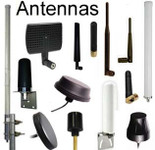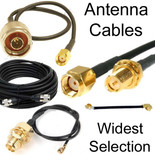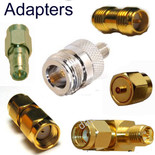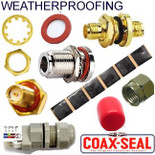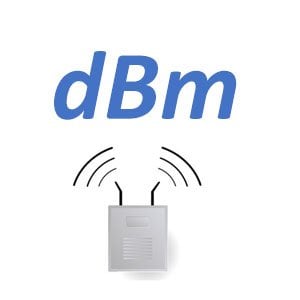Antennas, Antenna Cables, Wireless Products: Technical Articles
Use USB cable(s) to place WiFi adapter outside for line-of-site (negligible signal loss in cable)
USB Cables for WiFi
USB Cables for Wi-Fi Adapters are a much better choice than standard coax Antenna Cables because antenna cables (coax) lose a lot of signal-strength. USB cables lose little signal: Hardly any, in comparison.
Antenna cables - the type that go between a Wi-Fi device and an antenna - are "coaxial" type cables: These coaxial cables lose a significant amount of the WiFi signal in every meter of coax cable (1/2 to 1 dBi per meter is typical).
Solution for loss of signal in antenna cables:
- Use USB extension cables to bring the USB WiFi adapter closer to the antenna: As close as possible.
- USB cables enable antenna positioning flexibility: Up to 25 meters (80 ft), with minimal signal loss (see details below)
- If the USB WiFi adapter must be positioned outdoors: Use Outdoor Enclosure or Window Mount for Alfa USB WiFi adapters
- Keep the antenna cable (coax) as short as possible, or connect the antenna directly to the USB Wi-Fi device if possible.
USB Cable offerings:
- Data Alliance's "active" USB cables have performance much better than all other "active" USB cables that we have tested.
- "Active" USB ext. cables have the ability to extend beyond 15 feet (4 meters): Connect up to five of these cables for length up to 80-feet (25 meters)
- 10-meter active USB extension cable: Combine with other Active USB cables for length of 80-feet (25m)
- USB Cable Extender: Up to 60-meters / 197-FT over CAT5 / CAT6 Cable: See CAT5e cable offering
WATERPROOF Connections: To waterproof USB connections that might be exposed to rain, sea mist, etc:
- Use silicone grease: Cover the USB cable connections with silicone grease to waterproof them: Only $1.79.
- Cable for ALFA USB Wireless Adapters: Keep USB connection dry if you can reach covered area with this 4-meter cable
- B-mini connection fits Alfa and A-male connects to PC.
Details:
- "Active" USB cables lose only about 2.1% of signal per five meters - and so provides much more signal strength from your USB wireless adapter, compared to using coax antenna cables.
Other benefits:
- USB cables are simple: Not confusing like antenna cables' confusing connectors.
- USB extension cables have many alternative, practical uses if you later do not need it for your Wi-Fi adapter.
POWER to USB device: Transmitters need power. More power results in greater range. It is critical that the transceiver receives enough power to do its job. Some (older) laptops do not provide enough power via a (single) USB port. Drawing power from multiple ports can be a solution. Also using high quality USB cables and keeping cable runs short helps. Alternative, one needs to provide an external source of power.

